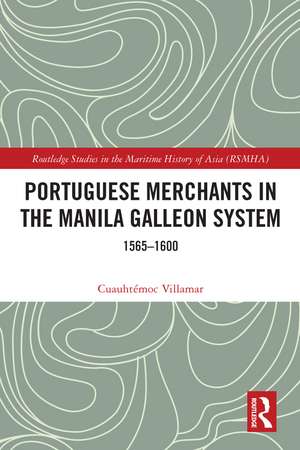Portuguese Merchants in the Manila Galleon System: 1565-1600: Routledge Studies in the Maritime History of Asia
Autor Cuauhtémoc Villamaren Limba Engleză Paperback – 31 mai 2023
The rise of Manila as a crucial transshipment port was not a spontaneous incident. Instead, it came about through a complex combination of circumstances and interconnections that nurtured the establishment of the Manila Galleon system, a trading mechanism that lasted two and half centuries from 1565 until 1815. Villamar analyses the establishment of the regulatory framework of the trade across the Pacific Ocean as a whole setting that provided legality to the transactions, predictability to the transportation and security to the stakeholders. He looks both at the Spanish crown strategy in Asia, and the emergence of a network of Portuguese merchants located in Manila and active in the long-distance trade. This informal community of merchants participated from the inception of the trading system across the Pacific, with connections between Europe, ports in Asia under the control of Portugal, the Spanish colonies in America, and the city of Manila. From its inception, the newly-founded capital of the Philippines became a hub of connections, attracting part of the trade that already existed in Asia. Surveying the Portuguese commercial networks from the ‘Estado da Índia’ across the ‘Spanish lake,’ this book sheds light on the early modern globalization from a truly comprehensive Iberian perspective.
This is a valuable resource for scholars of Pacific and Iberian trade history and the maritime history of Asia.
| Toate formatele și edițiile | Preț | Express |
|---|---|---|
| Paperback (1) | 389.66 lei 6-8 săpt. | |
| Taylor & Francis – 31 mai 2023 | 389.66 lei 6-8 săpt. | |
| Hardback (1) | 1000.45 lei 6-8 săpt. | |
| Taylor & Francis – 17 dec 2020 | 1000.45 lei 6-8 săpt. |
Preț: 389.66 lei
Nou
Puncte Express: 584
Preț estimativ în valută:
74.57€ • 77.57$ • 61.56£
74.57€ • 77.57$ • 61.56£
Carte tipărită la comandă
Livrare economică 15-29 aprilie
Preluare comenzi: 021 569.72.76
Specificații
ISBN-13: 9780367615567
ISBN-10: 0367615568
Pagini: 224
Ilustrații: 4 Tables, black and white; 1 Illustrations, black and white
Dimensiuni: 156 x 234 x 12 mm
Greutate: 0.45 kg
Ediția:1
Editura: Taylor & Francis
Colecția Routledge
Seria Routledge Studies in the Maritime History of Asia
Locul publicării:Oxford, United Kingdom
ISBN-10: 0367615568
Pagini: 224
Ilustrații: 4 Tables, black and white; 1 Illustrations, black and white
Dimensiuni: 156 x 234 x 12 mm
Greutate: 0.45 kg
Ediția:1
Editura: Taylor & Francis
Colecția Routledge
Seria Routledge Studies in the Maritime History of Asia
Locul publicării:Oxford, United Kingdom
Public țintă
Postgraduate and Undergraduate AdvancedCuprins
Introduction First Section: Origins of the Manila Galleon System 1. Rivalry and complexity of the Iberian monarchies 2. Southeast Asia in the Early Modern Period 3. Birth of the Manila Galleon System Second Section: The Art of Trade 4. The Portuguese legacy in Manila 5. Wealth and power 6. An evolving merchant network 7. The art of commerce and representation Third Section: Trans-Pacific Connections 8. Diego Hernandez Victoria, the Merchant of Manila 9. Mexican connections
Notă biografică
Cuauhtémoc Villamar is a retired career diplomat who served in the Mexican Foreign Service for three decades, primarily in Asia. He was posted in China twice, Singapore, Thailand, and Canada, specialising in economic and cultural promotion as well as in technical cooperation. He has a PhD in History from the National University of Singapore.
Recenzii
"Villamar’s entry to the still slowly increasing canon of works on the Manila Galleon nevertheless helps to flesh out the picture of how it developed and in practice operated. It is particularly valuable in shining light on the activities of individual merchants, putting a face, as it were, to this important stage in early globalization."
Peter Gordon, Asian Review of Books
Peter Gordon, Asian Review of Books
Descriere
Villamar examines the role of Portuguese merchants in the formation of the Manila Galleon as a system of trade founded at the end of the sixteenth century. Surveying the Portuguese commercial networks from the ‘Estado da Índia’ across the ‘Spanish lake,’ this book sheds light on the early modern globalization from a Iberian perspective.


